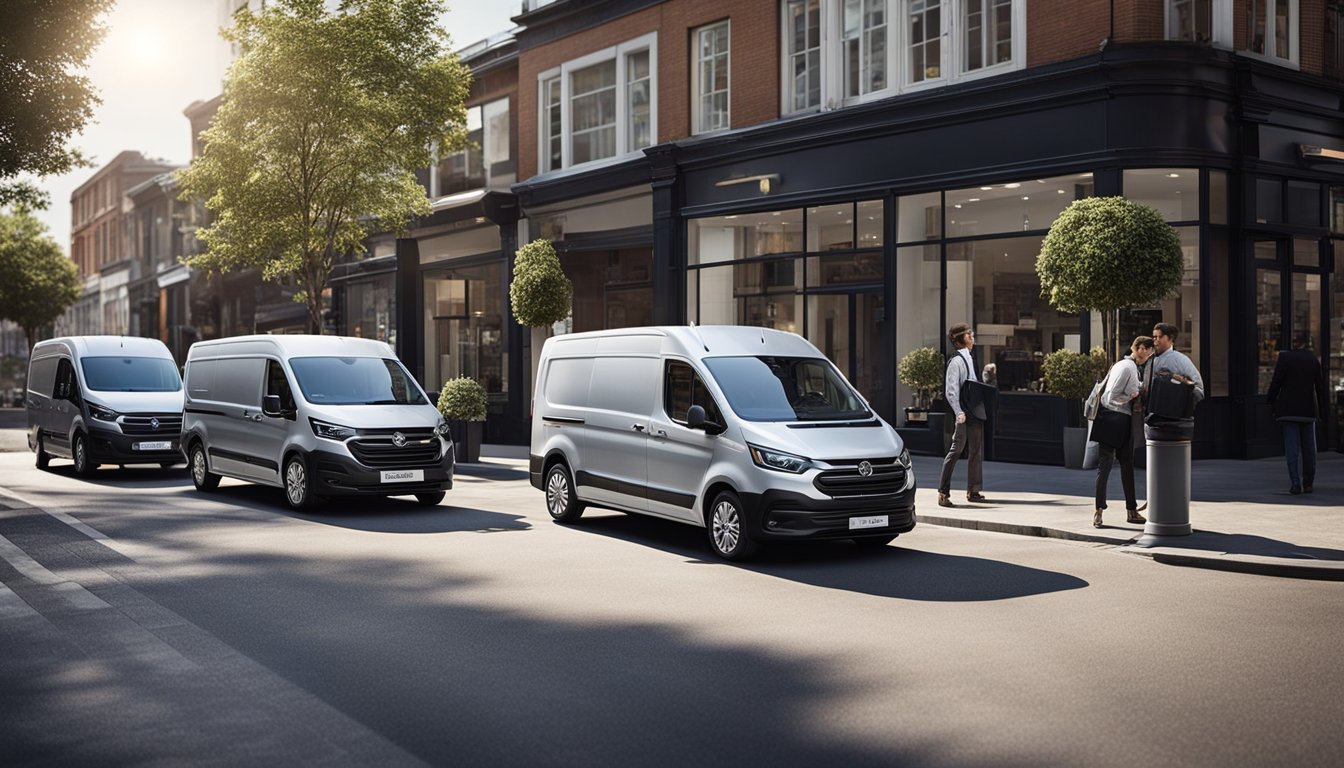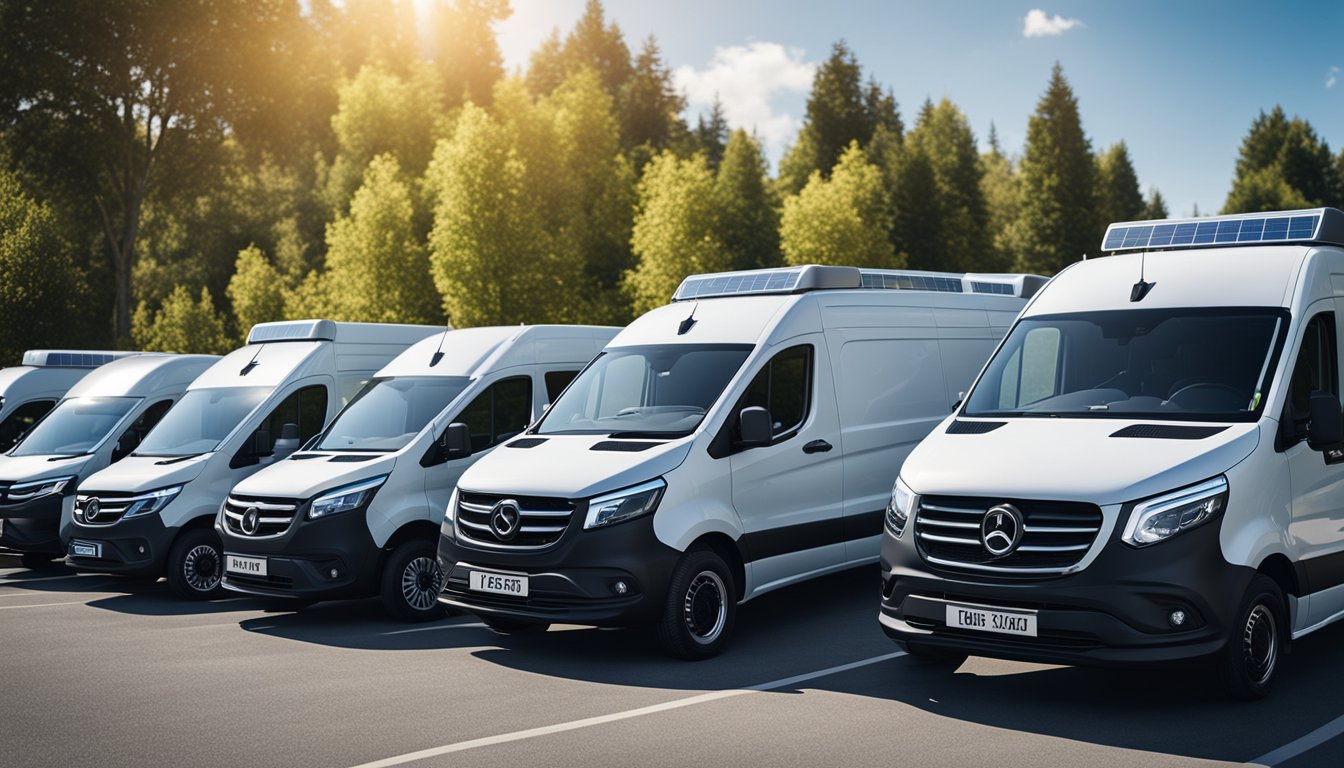Late updated: 10 Jul 2024 14:07
Written by: Amber Collins
Comparing Electric Vans For Small Businesses: Best Options Revealed
Electric vans represent a transformative shift for small businesses seeking to reduce their carbon footprint and operating costs. As we navigate through an era where sustainability is no longer an option but a necessity, understanding the available electric vans becomes crucial. The best electric vans for small businesses combine practical cargo space, reliability, and advanced technological features.

Among the top contenders, the Ford e-Transit offers versatile configurations with three roof heights and body lengths, catering to diverse business needs. Its 68-kWh battery provides a substantial driving range, ensuring smooth and uninterrupted operations for urban deliveries. Also noteworthy is the compact Chevy City Express, designed for smaller fleets, boasting manoeuvrability without sacrificing interior space.
Exploring more options, the Mercedes-Benz Sprinter and Nissan NV200 offer great reliability and cargo space, making them excellent choices for various business requirements. Each model brings unique strengths, from extensive storage capabilities to cutting-edge safety features, making them invaluable assets to small business operations.
Key Takeaways
- Electric vans offer practical cargo space and advanced features.
- Ford e-Transit provides versatility and substantial driving range.
- Chevy City Express and other models cater to diverse business needs.
Evaluating Electric Van Options for Small Businesses

Choosing the right electric van for your small business involves evaluating multiple factors including the available market options, key considerations specific to business needs, and the financial implications of leasing versus buying.
Overview of the Electric Van Market
The electric van market has seen substantial growth. Manufacturers are increasingly offering models that cater to various business needs.
Ford e-Transit: Known for its versatility, it offers three roof heights and body lengths, with a range of 108 to 126 miles.
Citroën e-Berlingo: Ideal for urban settings, it features a range of 171 miles and quick charging capabilities.
Vauxhall Combo: Offers a well-rounded solution with about 171 miles per charge and a substantial cargo space of 155 cubic feet.
These models reflect the trend towards eco-friendly, efficient transport solutions suitable for small businesses.
Key Considerations for Small Businesses
When selecting an electric van, we must consider several vital factors.
-
Cargo Space and Payload Capacity: Small businesses like couriers and contractors need ample cargo space. For example, the Vauxhall Combo offers 155 cubic feet of space with a payload capacity of 770 kg.
-
Battery Capacity and Range: Understanding the range is crucial for operational efficiency. The Ford e-Transit provides up to 126 miles, making it suitable for last-mile delivery and short-distance transport.
-
Maintenance and Running Costs: Electric vehicles typically have lower maintenance costs compared to traditional vehicles. This can significantly reduce the total cost of ownership over time.
-
Upfitting: Customisation options like shelving and tool storage are essential for specialised businesses. Vans like the Ford e-Transit offer flexible upfitting solutions.
Financial Aspects: Leasing vs. Buying
Deciding between leasing and buying an electric van involves weighing several financial factors.
-
Leasing: This option often includes maintenance and may come with lower monthly payments. It also provides the flexibility to upgrade to newer models more frequently.
-
Buying: While more expensive upfront, owning an electric van provides potential long-term savings and tax benefits. Ownership allows for unlimited mileage and full customisation of the vehicle.
-
Grants and Incentives: Various government grants and tax breaks can make purchasing more affordable. For instance, drivers in the UK might benefit from reduced congestion charges for electric vehicles.
The financial decision should align with the business’s long-term strategy and cash flow capabilities. Evaluating the total cost of ownership, including operational costs, helps in making an informed choice.
Technological Advancements and Features

In recent years, electric cargo vans have significantly evolved with advanced power systems, enhanced safety and comfort, and customisable storage solutions. These technological strides are critical for businesses that rely on efficiency, eco-friendliness, and practicality.
Advances in Electric Power and Performance
Electric cargo vans now boast impressive power and range capabilities. For instance, the Ford e-Transit offers a range of 126 miles with its 68-kWh battery. Meanwhile, the Mercedes eSprinter delivers up to 210-220 miles, depending on the variant, with options ranging from 134 to 201 horsepower.
Rapid charging is a game-changer, reducing downtime. Modern vans can achieve significant charge levels within a short period, thanks to advancements in charging technology.
Enhanced motor efficiency and battery life further contribute to improved vehicle performance and reductions in total operating costs.
Safety and Comfort in Electric Commercial Vehicles
Safety and comfort are paramount in modern commercial vans. Features such as adaptive cruise control, lane-keeping assist, and automatic emergency braking have become standard in many models, promoting safer driving experiences.
Comfort features such as ergonomic seating, advanced climate control, and contemporary infotainment systems including Apple CarPlay and Android Auto, are designed to make long trips more comfortable for drivers.
Noise reduction is notable in electric vans, providing a quieter and less stressful driving environment compared to traditional internal combustion engine (ICE) vans.
Customisation and Storage Solutions
Electric cargo vans offer versatile customisation options to meet diverse business needs. Manufacturers provide various roof heights and body lengths, such as with the Ford e-Transit's three available configurations.
Storage solutions are another focal point, with electric vans often featuring underfloor batteries, maximizing cargo volume without impeding space. Businesses can equip vans with specific shelving, racks, and storage systems tailored to their operation's requirements.
By choosing eco-friendly vans with zero emissions, businesses contribute to lowering their carbon footprint, aligning with sustainability goals. This flexibility in design and storage makes electric vans a compelling choice for operations demanding extensive adaptability.
Frequently Asked Questions
Electric vans have risen in popularity among small businesses due to their potential for cost savings and environmental benefits. We will address key questions small business owners often have when considering an electric van for their operations.
What features should be considered when selecting an electric van for a small business?
Key features to look for include battery range, cargo capacity, warranty options, and charging infrastructure. Evaluating these aspects ensures the vehicle meets daily operational needs and long-term business goals.
How do electric vans compare in terms of operational costs and efficiency?
Electric vans often have lower fuel costs and reduced maintenance requirements compared to diesel vans. However, initial purchase prices and battery replacement costs should be considered when comparing overall expenses.
What is the typical range of electric vans available on the market?
Ranges vary significantly; small electric vans can typically drive 160 to 190 miles on a single charge. Medium electric vans have ranges between 140 to 220 miles, depending on battery size and model.
Which manufacturers offer the most reliable electric vans for commercial use?
Notable manufacturers include Ford with its e-Transit, Renault with the Kangoo E-Tech, and Peugeot with the e-Expert. These brands are recognised for their reliability and range of commercial electric vehicles.
How does the cargo capacity of electric vans compare to traditional diesel vans?
Electric vans generally offer comparable cargo space to their diesel counterparts. Factors like battery placement and vehicle design can influence capacity, but modern electric vans are designed to maximise efficiency without compromising payload.
What government incentives are available for small businesses purchasing electric vans?
Government incentives can include grants, tax rebates, and exemptions from certain charges such as congestion fees. Checking local and national schemes will help small businesses capitalise on these benefits to reduce the financial burden of switching to electric vehicles.
